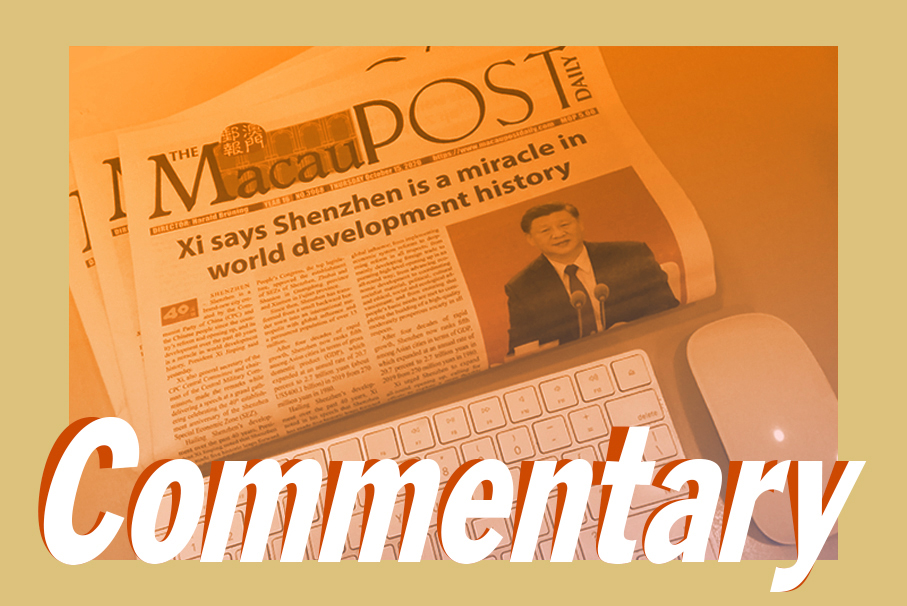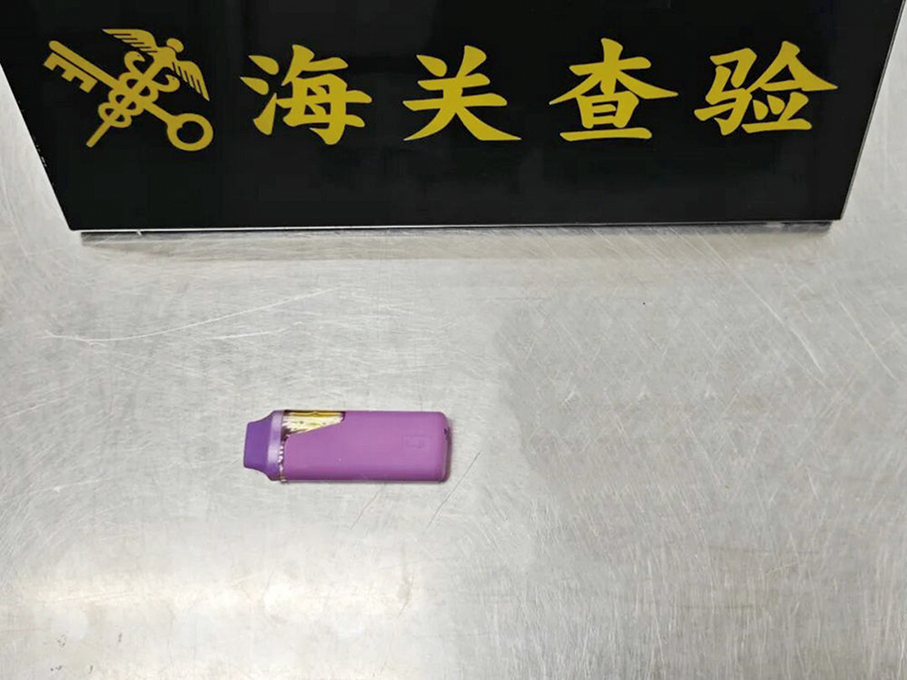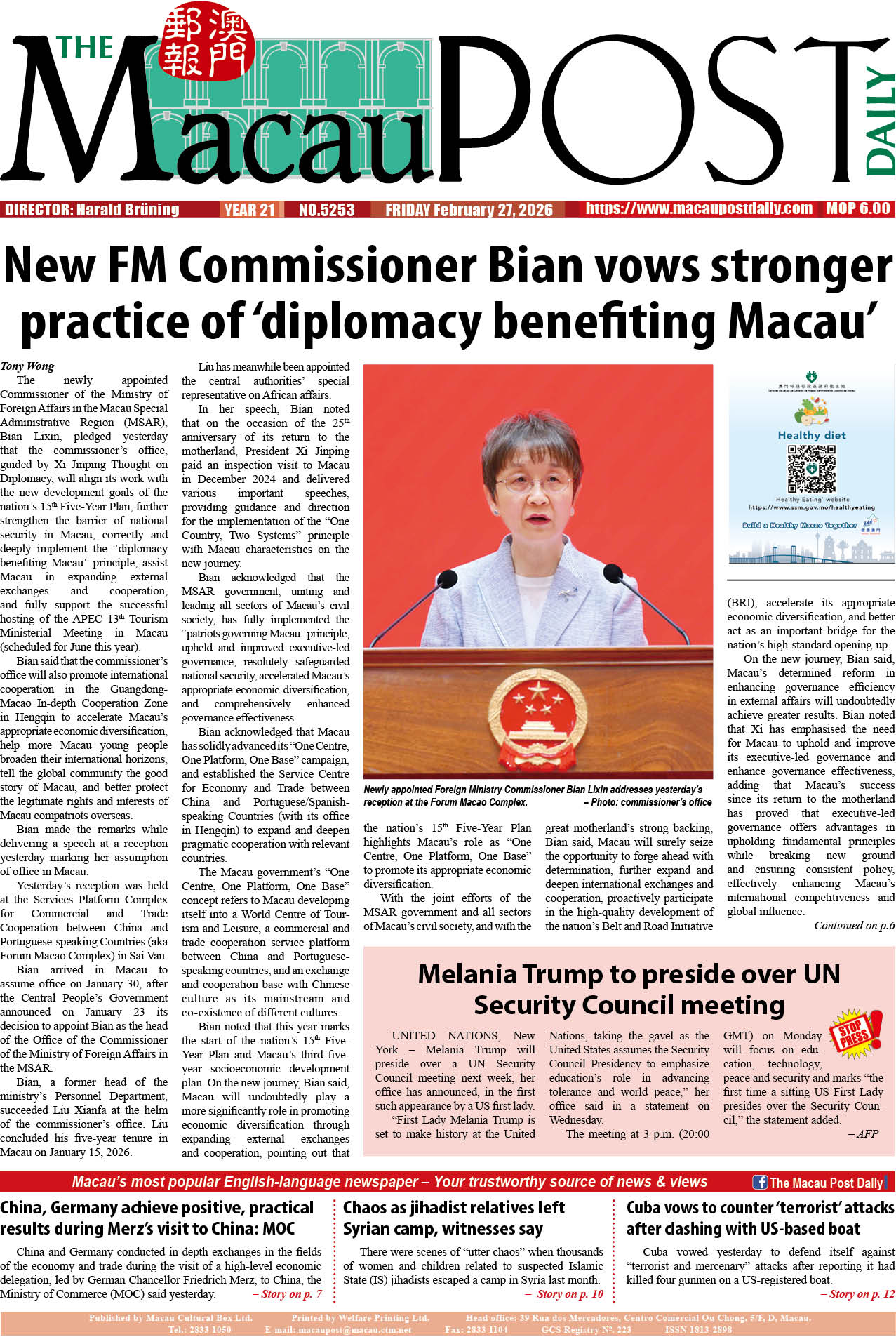Addressing yesterday’s press conference about Macau’s novel coronavirus (COVID-19) situation, the Health Bureau’s (SSM) Control of Communicable Diseases and Surveillance of Diseases Department Coordinator Leong Iek Hou announced that the 20th round of the government’s facemask purchase scheme – which will start tomorrow – will last 30 days, during which each local resident and non-resident worker will be entitled to buy 30 facemasks at the fixed price of 24 patacas at designated outlets upon presentation of their original Macau ID card or work permit (informally known as a “blue card”).
Since the launch of the facemask purchase scheme on January 23, each round had lasted 10 days, during which each local resident and non-resident worker was entitled to buy 10 facemasks at the fixed price of eight patacas every 10 days.
Leong said that the new arrangement for the 20th round of the scheme aimed to make it more convenient for residents to buy the government-arranged facemasks – colloquially known as “government facemasks” – i.e. they will not need to buy 10 facemasks in 10-day intervals from designated outlets and instead can buy 30 facemasks every 30 days from tomorrow. Leong said that the new measure could also reduce crowds at the facemask sale outlets.
As in the previous rounds, the 30-day-period round continues to ensure that each local resident and non-resident worker can have a facemask for each day at the fixed price of 80 avos (cents) each.
As the next round will last 30 days, from tomorrow in each round parents or legal guardians will be entitled to buy 30 facemasks for each child aged between five and eight, and 15 facemasks for each kid aged between three and four.
The 20th round of the scheme will run from tomorrow to August 29.
Leong said that as the government’s facemask purchase scheme has been running for 19 rounds, residents have now become “very familiar with buying the government facemasks”, which she said had enabled the government to extend the length of each round of the scheme.
The sale of child facemasks – for those aged between three and eight – was first available in February when the scheme’s third round started.
Between the third and the 12th round, with each round lasting 10 days, parents or legal guardians were entitled to buy five child facemasks with the child’s ID card, with the remaining five being adult facemasks, or alternatively they could choose to use the whole quota of 10 for adult facemasks.
Between the 13th and the outgoing 19th round, in each 10-day round parents or legal guardians were entitled to 10 facemasks for each child aged between five and eight, or alternatively they could choose to buy five child facemasks and five adult facemasks, or choose to use the whole quota of 10 for adult facemask. Parents or legal guardians remained entitled to buy five facemasks for each child aged between three and four plus five adult facemasks, or alternatively they could choose to use the whole quota of 10 for adult facemasks.
According to Leong, parents or legal guardians will now be entitled to buy 30 facemasks for each child aged between five and eight in the 20th round (30 days), or alternatively they can choose to buy 15 child facemasks and 15 adult facemasks, or choose to use the whole quota of 30 for adult facemasks.
In the 20th round which will start tomorrow, parents or legal guardians will now be entitled to buy 15 facemasks for each child aged between three and four plus 15 adult facemasks, or alternatively they can choose to use the whole quota of 30 for adult facemasks, according to Leong.
Unchanged from the previous rounds, there are 84 outlets for the new 20th round, comprising 56 designated pharmacies, eight health centres in Macau and Taipa and two health stations in Coloane run by the Health Bureau (SSM), as well as 18 co-called service points run by the Macau Federation of Trade Unions (Gung Luen), Macau General Union of Neighbourhood Associations (Kai Fong) and Macau Women’s General Association (Fu Luen).
Child facemasks are only sold at the bureau’s health centres and health stations. The price of child facemasks is the same as for adult facemasks.
Observers have noted that close to 100 percent of people in Macau wear facemasks when out and about. Apart from the “government facemasks”, facemasks are also available at commercial prices in the private market.
‘Enough facemasks’
Alvis Lo Iek Long, a clinical director of the public Conde de São Januário Hospital Centre, said during yesterday’s press conference that the government can guarantee that it has enough facemasks for all those eligible to buy them over the next 30 days.
Lo underlined that the increase in the length of the 20th round of the facemask purchase scheme merely aimed to make it more convenient for residents to buy the “government facemasks” and did not mean that the government plans to make the scheme permanent. Lo reaffirmed that the government will make an announcement in advance about its decision on whether it will continue with its facemask purchase scheme.
108 million ‘government facemasks’ sold already
Lo said that 108 million “government facemasks” have been sold since the scheme’s launch in January. Lo said that 4.5 million facemasks have been sold in the 19th round, down from the peak of six million facemasks sold in a particular round, adding that this situation was due to the fact that the supply of facemasks in the private market has now become sufficient compared to when the COVID-19 epidemic emerged in Macau early this year and that the price of facemasks in the private market has decreased.
According to Lo, Macau has not recorded a new COVID-19 case for 33 days, while no local case has been confirmed for 122 days. All 46 COVID-19 patients have been discharged from hospital.
HK man from Macau tests positive for COVID-19 in HK
Meanwhile, Leong said during yesterday’s press conference that a 62-year-old Hong Kong man who had worked in Macau since March and returned to Hong Kong on July 11 has tested positive for COVID-19 there.
Leong said that both the local and Hong Kong health authorities have determined that the Hong Kong man has been infected with the novel coronavirus in Hong Kong rather than in Macau, adding that therefore the Macau Health Bureau has decided not to investigate his travel history during his stay in Macau.
According to Leong, the Hong Kong man, who worked as a renovation worker in Macau, underwent a nucleic acid test (NAT) in Macau on July 10 and tested negative for COVID-19. He returned to Hong Kong via the Hong Kong-Zhuhai-Macau Bridge (HZMB) the next day. Upon arrival in Hong Kong, he started to undergo mandatory quarantine in his home where he lives with his wife and two sons.
The man’s older son had been in touch with several confirmed COVID-19 patients in Hong Kong before being diagnosed with the novel coronavirus disease there on Monday, Leong said, adding that therefore the Hong Kong Department of Health (DH) arranged for the man and his wife, who both had come down with COVID-19 symptoms, to be tested for COVID-19, before both were diagnosed with the disease on Tuesday.
According to Leong, both the local and Hong Kong health authorities have determined that the man has been infected with COVID-19 by his family members during his home quarantine period.
Alvis Lo Iek Long (left), one of the three clinical directors of the public Conde de São Januário Hospital Centre, speaks during yesterday’s press conference about city’s novel coronavirus (COVID-19) situation, as Health Bureau (SSM) Control of Communicable Diseases and Surveillance of Diseases Department Coordinator Leong Iek Hou looks on. Photo: Tony Wong








